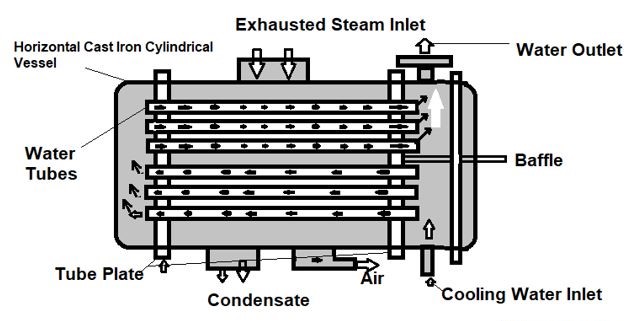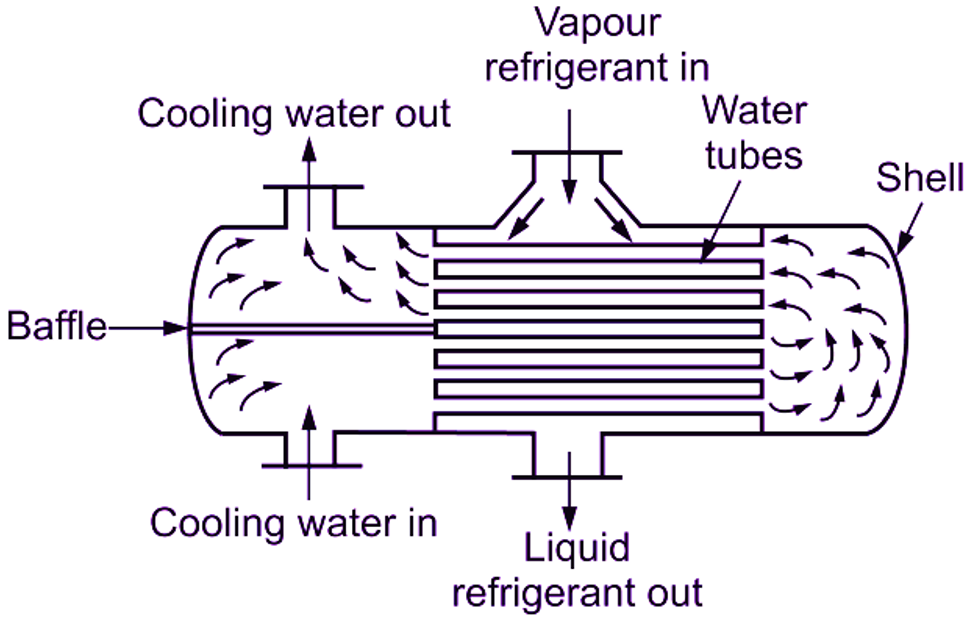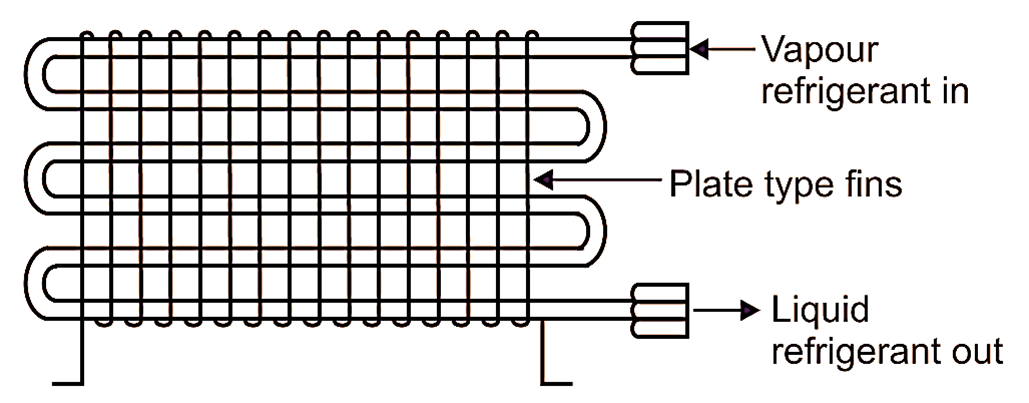Table of Contents
What is Condenser?
Condensers play a pivotal role in various industries, from refrigeration and air conditioning to chemistry and power generation. Despite their ubiquitous presence, many people remain unaware of the intricate mechanisms and diverse applications of condensers. We will explore into the world of condensers, exploring their types, functions, applications, and the underlying principles that make them indispensable in modern technology.
Understanding Condensers – Basics and Types
The Fundamental Concept of Condensation
Condensation is a phase change phenomenon in which a substance transitions from a gaseous state to a liquid state. Condensers are devices designed to facilitate this transition by removing heat from a substance, thereby causing it to condense. This process is essential in numerous applications, ranging from refrigeration to power plants.
Types of Condenser
- Surface Condenser
Surface condensers are commonly employed in power plants and industrial settings. They consist of a network of tubes through which a cooling fluid circulates, promoting the condensation of vapor. The condensed liquid is then collected and removed, leaving behind a more efficient system.

- Shell and Tube Condenser
Shell and tube condensers utilize a design where the vapor flows through tubes while the cooling fluid surrounds them in a shell. This design maximizes the surface area for heat exchange, enhancing the condensation process. These condensers find applications in various industries, including chemical processing and refrigeration.

- Air-Cooled Condenser
Unlike water-cooled condensers, air-cooled condensers dissipate heat through direct contact with ambient air. This design is commonly found in refrigeration systems and air conditioning units, offering advantages in locations where water availability is limited.

Condenser Main Functions
- Refrigeration and Air Conditioning
Condensers play a crucial role in refrigeration and air conditioning systems. In these applications, a refrigerant undergoes a cycle of compression, condensation, expansion, and evaporation. The condenser is where the refrigerant releases heat to the surroundings, causing it to transition from a vapor to a liquid state. This process is vital for maintaining the desired temperature in enclosed spaces.
- Power Generation
Condensers are integral components in steam power plants, contributing to the efficiency of electricity generation. In these plants, steam produced by boiling water in a boiler is expanded through turbines to generate electricity. The condenser then turns the steam back into water, allowing it to be pumped back to the boiler for the cycle to continue.
- Chemical Processing
In chemical industries, condensers are utilized for various purposes, such as recovering solvents, removing heat from reaction vessels, and facilitating the condensation of volatile substances. Their versatility makes them indispensable in processes ranging from petrochemical production to pharmaceutical manufacturing.
The Science Behind Condensation
- Heat Transfer and Thermodynamics
Condensation involves the transfer of heat from the substance undergoing condensation to the surrounding environment. This heat transfer follows the laws of thermodynamics, specifically the principles of conservation of energy. Understanding these thermodynamic principles is essential for designing efficient condenser systems.
- Phase Diagrams and Critical Points
Phase diagrams illustrate the relationships between temperature, pressure, and the states of matter. The critical point, where a substance can exist as both a liquid and a vapor, is a crucial consideration in condenser design. Engineers must carefully analyze these diagrams to optimize condenser performance.
Challenges and Innovations in Condenser Technology
- Fouling and Corrosion
Condenser efficiency can be compromised by fouling, the accumulation of unwanted deposits on the heat transfer surfaces, and corrosion, which can degrade the materials over time. Ongoing research focuses on developing materials and coatings to mitigate these challenges and extend the lifespan of condenser systems.
- Sustainable Condenser Design
As the world strives for sustainability, researchers are exploring environmentally friendly alternatives in condenser design. This includes the use of eco-friendly refrigerants, improved energy efficiency, and the development of condensers that minimize water consumption in cooling processes.
Future Trends and Advancements in Condenser Technology
- Smart Condenser Systems
The integration of smart technologies, such as sensors and automation, is revolutionizing condenser systems. These advancements enable real-time monitoring, predictive maintenance, and enhanced control over condensation processes, contributing to increased efficiency and reduced energy consumption.
- Nanotechnology in Condenser Design
Nanotechnology is poised to make a significant impact on condenser technology. The use of nanomaterials and coatings can improve heat transfer efficiency, reduce fouling, and enhance the overall performance of condenser systems.
Condenser Real-World Applications
- HVAC Systems
Heating, Ventilation, and Air Conditioning (HVAC) systems rely heavily on condensers to regulate indoor temperature and humidity. In these systems, a refrigerant absorbs heat from indoor air, undergoes compression, and then releases heat in the condenser to the external environment. This process is vital for maintaining comfortable living and working conditions in residential, commercial, and industrial buildings.
- Distillation Processes
Condensers are integral components in distillation processes, where mixtures of liquids with different boiling points are separated. As vapor rises through a distillation column, it encounters a condenser where it is cooled and condensed back into a liquid. This allows for the collection of purified substances, making condensers essential in industries such as petrochemicals, beverages, and pharmaceuticals.
- Laboratory Applications
In laboratories, condensers are frequently used in various experimental setups. For example, in chemistry, reflux condensers are employed to prevent the loss of volatile substances during reactions by returning evaporated solvents back to the reaction vessel. This ensures efficient use of chemicals and minimizes waste.
- Geothermal Power Plants
Geothermal power plants harness the Earth’s internal heat to generate electricity. Steam, produced by tapping into underground reservoirs of hot water or steam, is directed through turbines to generate power. Condensers are then used to convert the steam back into water for re-injection into the Earth, completing the geothermal energy cycle.
Importance of Condenser in Energy Efficiency
- Energy Recovery
Condensers contribute significantly to energy efficiency in various systems. For instance, in HVAC systems, energy recovery ventilators use condensers to transfer heat and humidity from outgoing air to incoming air, reducing the overall energy consumption for heating and cooling. This principle is crucial in achieving sustainable and energy-efficient building designs.
- Combined Heat and Power (CHP) Systems
Cogeneration, or combined heat and power systems, use the same energy source to concurrently produce useful electricity and heat. Condensers play a key role in these systems by recovering and utilizing the excess heat generated during electricity production. CHP systems are valued for their high efficiency compared to conventional power plants.
Challenges in Condenser Technology and Solutions
- Fouling and Corrosion Mitigation: Fouling, the accumulation of deposits on condenser surfaces, and corrosion pose challenges to the efficiency and longevity of condenser systems. Ongoing research focuses on the development of advanced materials and coatings that resist fouling and corrosion, ensuring optimal performance and minimizing maintenance requirements.
- Environmental Impact and Sustainability: The environmental impact of refrigerants used in condenser systems has drawn increasing attention. Many traditional refrigerants, such as chlorofluorocarbons (CFCs) and hydrochlorofluorocarbons (HCFCs), contribute to ozone depletion and global warming. Innovations in refrigerant technology, including the use of hydrofluorocarbons (HFCs) and natural refrigerants, aim to reduce the ecological footprint of condenser systems.
Condenser in Climate Control
- Global Warming and Air Conditioning Demand: The need for air conditioning is growing as a result of climate change-related increases in global temperatures. Paradoxically, the energy-intensive nature of traditional air conditioning systems contributes to further warming. Condensers, being a critical component in these systems, play a role in the broader conversation about sustainable cooling solutions and the need for energy-efficient technologies.
- Evaporative Cooling and Alternative Approaches: In arid regions, evaporative cooling technologies are gaining popularity as an alternative to traditional air conditioning. These systems use water evaporation to cool air, and condensers play a crucial role in the phase change process. The exploration of such alternative approaches is essential in mitigating the environmental impact of climate control.
Condenser Technology in Future
- Integration of Renewable Energy: The integration of condenser technology with renewable energy sources, such as solar and wind power, is a promising avenue for the future. Advanced condenser systems can play a key role in enhancing the efficiency of renewable energy conversion processes, contributing to a more sustainable and Eco-friendly energy landscape.
- Continued Advancements in Materials Science: The ongoing advancements in materials science, particularly in nanotechnology, hold great potential for improving condenser efficiency. Nanostructured materials and coatings can enhance heat transfer, reduce fouling, and increase the resilience of condenser systems, paving the way for more robust and sustainable technologies.
| List of All Technologies |
|
| Cache | Compass |
| Internet | Electric Motor |
| Computer | |
FAQ’s on Condenser
What is the primary function of a condenser in an air conditioning system?
A condenser in an air conditioning system is primarily responsible for facilitating the phase change of refrigerant from a vapor to a liquid. During this process, heat is released to the external environment, allowing the system to maintain a comfortable indoor temperature.
How do condensers contribute to energy efficiency in power plants?
In power plants, condensers play a crucial role in converting steam back into water after it has passed through turbines to generate electricity. This condensation process allows the steam to be recycled and reused in the power generation cycle, contributing to the overall energy efficiency of the plant.
Can you explain the role of condensers in distillation processes?
In distillation processes, condensers are vital for the separation of liquids with different boiling points. As vapor rises through a distillation column, it encounters a condenser where it is cooled and condensed back into a liquid. This enables the collection of purified substances, making condensers essential in industries such as petrochemicals and pharmaceuticals.
What challenges do condensers face, and how are they addressed in modern technology?
Condensers often face challenges such as fouling, where unwanted deposits accumulate on surfaces, and corrosion, which can degrade materials over time. Ongoing research addresses these challenges through the development of advanced materials and coatings that resist fouling and corrosion, ensuring optimal performance and longevity.*
How are condensers adapting to advancements in smart technology?
With the integration of smart technologies, condenser systems are becoming more efficient and manageable. The use of sensors and automation allows for real-time monitoring, predictive maintenance, and enhanced control over condensation processes. This integration contributes to increased efficiency and reduced energy consumption in various applications.







